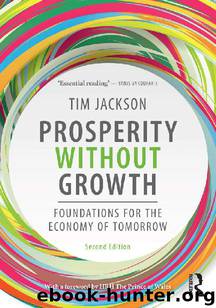Prosperity without Growth: Foundations for the Economy of Tomorrow by Tim Jackson

Author:Tim Jackson [Jackson, Tim]
Language: eng
Format: epub
ISBN: 9781317388210
Publisher: Taylor and Francis
Published: 2016-12-07T18:30:00+00:00
Money as a social good
The biggest challenge for such an investment strategy is the question of financing. So far in this chapter, we’ve been concerned mainly with what is sometimes called the ‘real economy’. It’s a term often used to describe the patterns of employment, production, consumption and investment in the economy. But it is useful to distinguish this real economy from the financial or ‘money economy’.
The money economy describes the wider set of financial flows on which the real economy depends. It includes the flow of money into and out of different economic sectors, the processes of borrowing, lending, creating money (the money supply), and the changes in the financial assets and liabilities of different economic actors. These stocks and flows of money are essential to the financing of investments in the real economy.
This is a complex terrain even to politicians and mainstream economists. Sometimes this complexity seems almost wilful; designed to obscure the profound implications of an economy that benefits the rich and massively inhibits government’s powers of social investment. If so, it’s been broadly successful. ‘It is well enough that the people of this nation do not understand our banking and monetary system’, said the US car manufacturer Henry Ford in the 1930s. ‘For if they did, I believe there would be a revolution before tomorrow morning.’30
To many non-economists, the existence of a debt-based money system itself comes as a complete surprise. We tend to think of money as something printed (or brought into existence electronically) by the Central Bank more or less under the control of the government. The reality is that less than 5 per cent of the money supply is created in this way. Most money circulating in advanced economies is created by commercial banks, almost literally ‘out of nothing’.31
When a bank agrees to create a loan to a business or a household, it simply enters the amount as a loan on the asset side of its balance sheet and the same amount as a deposit on the liability side of its balance sheet. This deposit is then available to spend on goods and services in the economy. Banks create money by making loans.32
There are a number of important implications of this debt-based money system. One of them is the degree of instability that ensues when things go wrong. Another is that government itself can only finance social investment through commercial (interest-bearing) debt. Another still is that the investment portfolio outlined in this chapter ends up having to compete for credit-worthiness against all sorts of other sometimes unsavoury commercial investments.
Sustainable investment must vie for funds, for example, with financial speculation in commodities, property or financial assets. It must prove its worth against entirely unsustainable consumer lending – in which repayment (and punishment for non-payment) is reinforced by legal institutions. It must compete with investments in dirty, extractive industries that degrade the environment, and in supply chains which are profitable only because they involve various forms of modern slavery.
Many of these massively unethical investments will offer highly attractive rates of return in the short term.
Download
This site does not store any files on its server. We only index and link to content provided by other sites. Please contact the content providers to delete copyright contents if any and email us, we'll remove relevant links or contents immediately.
The Meaning of the Library by unknow(2564)
Six Billion Shoppers by Porter Erisman(2296)
Why Nations Fail: The Origins of Power, Prosperity, and Poverty by Daron Acemoglu & James Robinson(2285)
No Time to Say Goodbye(2112)
Red Notice by Bill Browder(2070)
Currency Trading For Dummies by Brian Dolan(1921)
The Economist [T6, 22 Thg9 2017] by The Economist(1916)
Thank You for Being Late by Thomas L. Friedman(1766)
Bitcoin: The Ultimate Guide to the World of Bitcoin, Bitcoin Mining, Bitcoin Investing, Blockchain Technology, Cryptocurrency (2nd Edition) by Ikuya Takashima(1694)
Amazon FBA: Amazon FBA Blackbook: Everything You Need To Know to Start Your Amazon Business Empire (Amazon Empire, FBA Mastery) by John Fisher(1559)
Coffee: From Bean to Barista by Robert W. Thurston(1539)
The Future Is Asian by Parag Khanna(1480)
The Great Economists by Linda Yueh(1453)
Grave New World by Stephen D. King(1418)
How Money Got Free: Bitcoin and the Fight for the Future of Finance by Brian Patrick Eha(1418)
Pocket World in Figures 2018 by The Economist(1414)
Capitalism Without Capital: The Rise of the Intangible Economy by Jonathan Haskel(1391)
The Sex Business by Economist(1378)
Cultural Intelligence by David C. Thomas(1286)
